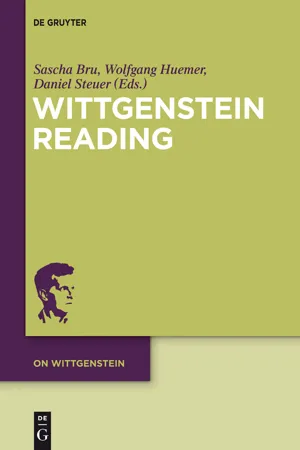
Wittgenstein Reading
- 424 pages
- English
- PDF
- Available on iOS & Android
Wittgenstein Reading
About this book
Wittgenstein's thought is reflected in his reading and reception of other authors. Wittgenstein Reading approaches the moment of literature as a vehicle of self-reflection for Wittgenstein. What sounds, on the surface, like criticism (e.g. of Shakespeare) can equally be understood as a simple registration of Wittgenstein's own reaction, hence a piece of self-diagnosis or self-analysis.
The book brings a representative sample of authors, from Shakespeare, Goethe, or Dostoyevsky to some that have received far less attention in Wittgenstein scholarship like Kleist, Lessing, or Wilhelm Busch and Johann Nepomuk Nestroy. Furthermore, the volume offers means for the cultural contextualization of Wittgenstein's thoughts.
Unique to this book is its internal design. The editors' introduction sets the scene with regards to both biography and theory, while each of the subsequent chapters takes a quotation from Wittgenstein on a particular author as its point of departure for developing a more specific theme relating to the writer in question. This format serves to avoid the well-trodden paths of discussions on the relationship between philosophy and literature, allowing for unconventional observations to be made. Furthermore, the volume offers means for the cultural contextualization of Wittgenstein's thoughts.
Tools to learn more effectively

Saving Books

Keyword Search

Annotating Text

Listen to it instead
Information
Table of contents
- List of Abbreviations
- Introduction
- Being Lost and Finding Home: Philosophy, Confession, Recollection, and Conversion in Augustine’s Confessions and Wittgenstein’s Philosophical Investigations
- The Character of a Name: Wittgenstein’s Remarks on Shakespeare
- To Not Understand, but Not Misunderstand: Wittgenstein on Shakespeare
- Sense and Sententiousness: Wittgenstein, Milton, Shakespeare
- Why the Tractatus, like the Old Testament, is “Nothing but a Book”
- Wittgenstein Lights Lichtenberg’s Candle: Flashlights of Enlightenment in Wittgenstein’s Thought
- Wittgenstein and Goethe: Getting Rid of “Sorge”
- Ludwig Wittgenstein and the Conservative Legacy of Johann Nepomuk Nestroy
- Best Readings: Wittgenstein and Grillparzer
- Wittgenstein’s Reception of Wagner: Language, Music, and Culture
- Ludwig Wittgenstein and Wilhelm Busch: “Humour is not a mood, but a ‘Weltanschauung’”
- Wittgenstein and Dostoevsky
- Wittgenstein Re-Reading
- The Significance of Dostoevsky (and Ludwig Anzengruber) for Wittgenstein
- A Remarkable Fact: Wittgenstein Reading Tolstoy
- Note to Self: Learn to Write Autobiographical Remarks from Wittgenstein
- Wittgenstein Reads Kürnberger
- Trakl’s Tone: Mood and the Distinctive Speech Act of the Demonstrative
- The Chimera of Language? Karl Kraus and Ludwig Wittgenstein
- Well-Versed: Wittgenstein and Leavis Read Empson
- The contributors of the volume
- Index of Names
Frequently asked questions
- Essential is ideal for learners and professionals who enjoy exploring a wide range of subjects. Access the Essential Library with 800,000+ trusted titles and best-sellers across business, personal growth, and the humanities. Includes unlimited reading time and Standard Read Aloud voice.
- Complete: Perfect for advanced learners and researchers needing full, unrestricted access. Unlock 1.4M+ books across hundreds of subjects, including academic and specialized titles. The Complete Plan also includes advanced features like Premium Read Aloud and Research Assistant.
Please note we cannot support devices running on iOS 13 and Android 7 or earlier. Learn more about using the app